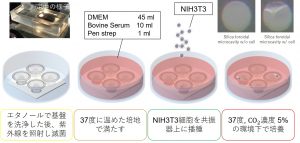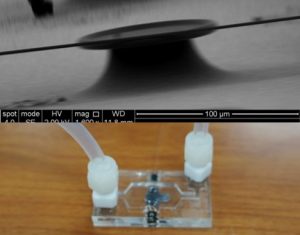Research Themes
Development of sensors capable of ultimate high-sensitivity detection
- Contents
Light is so fast that it passes through nanoparticles with little interaction when trying to detect them. However, when a micro optical cavity is used to strongly confine light, light can efficiently detect nanoparticles by simply attaching small particles to the micro optical resonator. Therefore, this research theme aims to develop sensors with ultimately high sensitivity using micro optical resonators with a strong confinement effect.
We have developed a technique for culturing cells on a micro optical resonator to elucidate the cell cycle, a high-sensitivity bacteria detection technique that can be used to confirm safety during blood transfusion, and pH and ammonia sensors with modifications on the surface of the resonator. Currently, we are developing a high-sensitivity hydrogen sensor.

We are also developing peripheral technologies such as compact packaging technology for micro optical resonators, which is important when using them as sensors.
- Key Technology Points
The most difficult point in sensor research is that it is a needs-oriented research. Although many papers have been published on sensor research, most of them are seed-oriented, and the number of truly usable sensors is limited.
Light is said to be suitable for sensing, but there are many alternative technologies. However, there are many alternative technologies available, so it is necessary to constantly scrutinize whether the sensor is really usable or not during research. It is necessary to consider whether sensing with light really has merit, including performance, cost, and market research, requiring extensive knowledge and the ability to foresee various things.

As of 2019, our laboratory is focusing on the development of hydrogen sensors. Although various hydrogen sensors, such as catalytic hydrogen sensors, have been studied and published at the laboratory level, interviews with companies and market surveys have revealed that there are only two types of sensors in practical use: contact combustion type combustion sensors and gas thermal conduction type sensors. However, hydrogen is a flammable gas, and sensors using electrical circuits always have a risk of ignition due to sparking. However, there is no such concern if light is used. Inspired by the expected thermoelectric sensor, we are trying to realize all-light detection of hydrogen gas by connecting a micro optical resonator sensor to an optical fiber.
Sensing research is needs-oriented, so it is necessary to run small projects with light footwork. In the past, we have obtained large research budgets, but we have confirmed on occasion that it is important to work lightly on footwork, so this research project is not a full-fledged project, but a free conception, emphasizing light footwork.
- Research Projects
As of 2019, our laboratory is focusing on the development of hydrogen sensors. Although various hydrogen sensors, such as catalytic hydrogen sensors, have been studied and published at the laboratory level, interviews with companies and market surveys have revealed that there are only two types of sensors in practical use: contact combustion type combustion sensors and gas thermal conduction type sensors. However, hydrogen is a flammable gas, and sensors using electrical circuits always have a risk of ignition due to sparking. However, there is no such concern if light is used. Inspired by the expected thermoelectric sensor, we are trying to realize all-light detection of hydrogen gas by connecting a micro optical resonator sensor to an optical fiber.
Sensing research is needs-oriented, so it is necessary to run small projects with light footwork. In the past, we have obtained large research budgets, but we have confirmed on occasion that it is important to work lightly on footwork, so this research project is not a full-fledged project, but a free conception, emphasizing light footwork.
Video to be replaced later
《 Keyword 》
Research Themes
- What is Professor Tanabe's education?
- About Research at Tanabe Lab.
- Must see! Laboratory Introduction Video
- Dig Deeper TANABE Lab.
- You get a good idea of what the lab is like!
- Laboratory Information Session for FY2024 Assignees
We are holding a lab information session for students who will be assigned in 2024. Open Labs are free to come and go as they please. Individual information sessions are also available at any time.
.
- 10/23 (Mon) 16:30- Briefing Session 1 (Location: Bldg. 14, 2F DS43)
- 10/27 (Mon) 18:00- Explanatory Session 2 (Location: Bldg. 14, 2F DR8)
- 11/ 2 (Thu) 16:30- 3rd briefing (Location: 14th Bldg., 2F DR7)
- Laboratory tours and open labs (as needed)
Individual Information Sessions and Lab Tours













